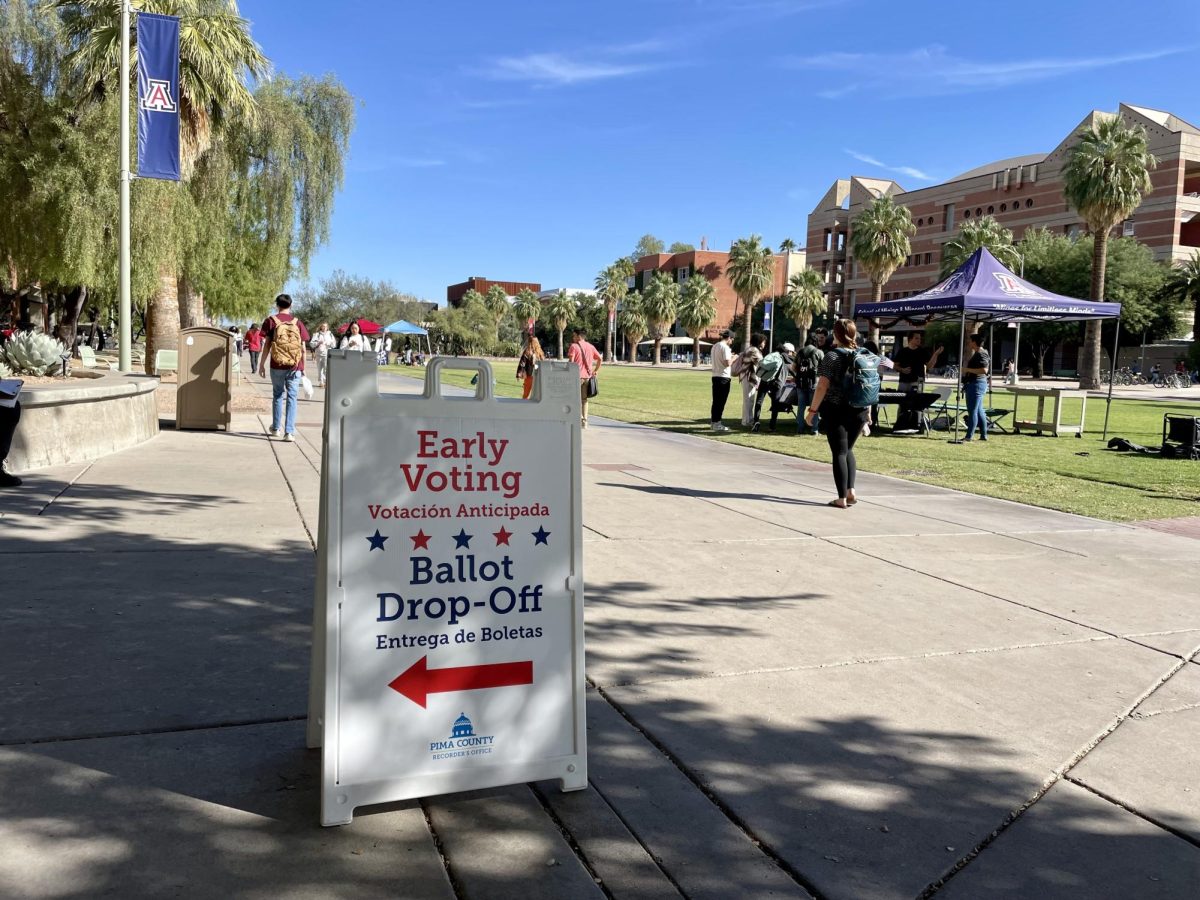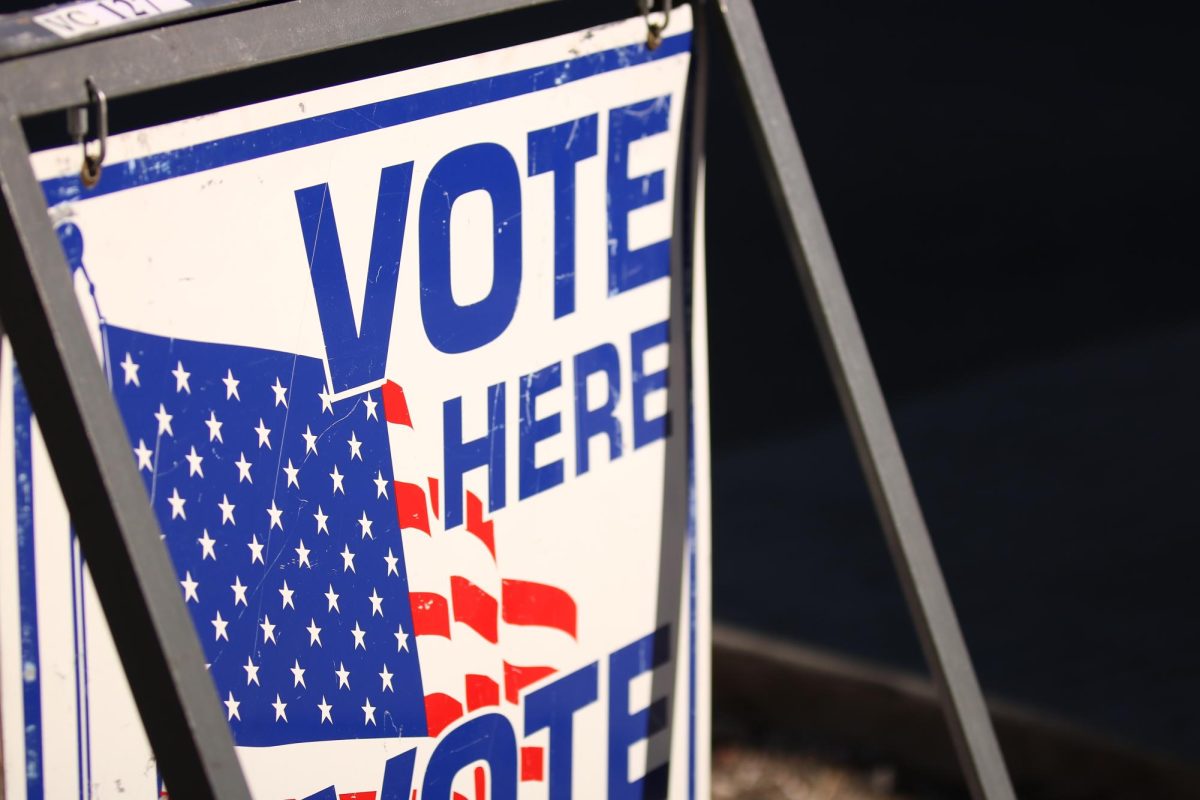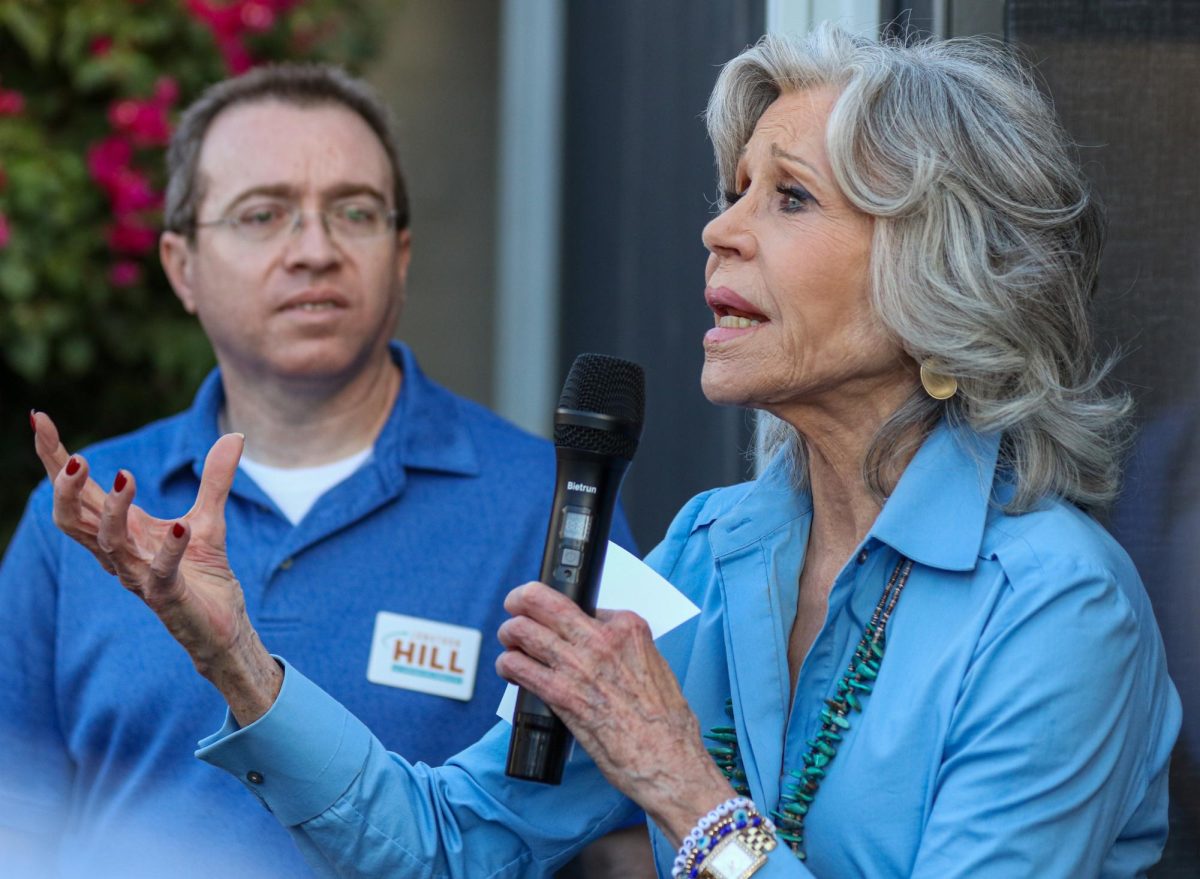On a temperate Valentine’s Friday afternoon, the University of Arizona felt like a large family, but this time a little extra than usual under Tucson’s mildly sunny sky.
An estimated 70-80 Wildcats joined their voices in front of the Old Main fountain with those of millions on the streets and in universities across the country in collective disapproval of President Donald Trump’s policies and in support for their undocumented, international, transgender and LGBTQ+ peers.
“Today, we gather in community power, for the people who have long been silenced, marginalized and criminalized by a system that profits off their exploitation,” Tucson artist and advocate Gem Abarca said. Gem is a member of UA’s MECHA, an organization that supports Chicano and underserved communities’ rights to pursue an education and find a place to belong. “The fight for migrant rights is a fight for human rights, in the same way that trans’, women’s, children’s and disabled peoples’ rights are human rights.”
Among some of the President’s policies that have sparked nationwide disquietude are the suspension of the U.S. Refugee Admissions Program, the withholding of birthright American citizenship from individuals born on the country’s soil from an undocumented or temporarily documented mother (such as on temporary student or work VISA), the rollback on transgender rights and the restoration of the 2019 policy “Designation for Expedited Removal.”
Under the “Designation for Expedited Removal” policy, the U.S.’ Department of Homeland Security (DHS) can deport people who are anywhere in the United States, but have not yet been paroled into the country and who can’t demonstrate that they have been present in the country for more than two years.
“It’s not [right] that those who are here and in the process of arranging their legal paperwork are at risk of being deported,” says Samuel Rodarte, UA archeology alumni in front of the University’s Old Main. “My mother is one of them.”
Meanwhile, chants like “Mr. Trump, let’s be clear, immigrants are welcome here,” echo loudly across the streets and sidewalks of campus.
In front of the many colorful flowers of Old Main, protesters raise bilingual signs reading “No human is illegal,” “Chinga la migra,” “Love the stranger: papers or not” and “Dinero para el pueblo” towards the warm late-noon sky.

“When I see an immigrant, I see someone who’s overworked and underpaid, just like me, and I see someone who’s forced to pay taxes for U.S. bloody wars and genocides,” Jocelyn García, student of law and President of the UA’s Students for Socialism (SFS) club said. “Immigrants’ struggles are our struggles.”
García is one of the organizers of the protest. Alongside her, representatives of UA’s MECHA and Coalición de Derechos Humanos.
“It Is on the land of the O’odham and the Yaqui that we find a community today, but when I look around, I see this military-industrial state polluting and dismantling our beautiful community,” says Gem.
Friday’s protesters highlighted that University of Arizona’s officials are not actively protecting their students, teachers and staff by allowing police, border patrol, military and ICE on campus.
“The University’s administration is not protecting all of us,” Desiree Nguyen, student of psychology, neuroscience and biology said. “We don’t need ICE raids, we need more funds for education and healthcare.”
On the same line of thought, Arian Chavez, UA student of physiology and exercise science, said “Our government can fund $7 billion for Border Patrol, while our country’s working class can’t afford housing, healthcare nor an education.”
Protesters held signs “Money for people’s needs, not for the War Machine” and “End the war in Gaza and Lebanon” or “Hands off Venezuela,” while A-10 Warthog military planes flew by high up in Tucson’s sky, indicating a sentiment of frustration towards U.S. foreign politics allocating taxpayers’ funds to wars and interests in Gaza, Lebanon and Latin America.
“Instead of allocating resources to working people’s needs, both Republicans and Democrats in power are investing in wars and deportations of people who are simply trying to make a living and survive, just like us,” Chavez further says, endorsed by a crowd of cheering supporters.
“No more deportations, no more occupations, fight for liberation!” chants continue to stir passion among the protesters in their communal walk from the Old Main to the UA Alumni Plaza.
“Deporting so many people just because they don’t have papers will also detriment the economy,” Eric Taylor, a graduate student in Middle Eastern Studies said. “And not allowing transgender people into their preferred bathrooms, or ‘othering’ people who are part of civil society… such initiatives are divisive and anti-democratic, if not downright hateful.”
Although smaller than some recent state capitols’ protests in main U.S. cities, UA’s student-organized protest represents one more fight in the history of an ongoing immigrant rights movement that’s been igniting the fire of passion since the first big demonstration in Chicago in 2006.
Between February 14 and May 1, 2006, around 400 protests in defense of immigrant rights took place in more than 200 U.S. cities. The first of these saw 100,000 people gather on the streets of Chicago, and up to 500,000 in Los Angeles and Dallas.
May 1, 2006, saw a nationwide boycott to demonstrate the value of immigrant communities for the U.S. economy.
2025 began similarly to 2006. On Feb. 5 of this year alone, an estimated 88 protests took place across 88 U.S. cities, and more are expected to join on President’s Day.
It’s the strong sentiment of preserving the spirit of America’s immigration legacy that has united the previous and current historical immigrant rights’ movements.
And the students and workers at the University of Arizona are part of it as well.
“Just like the monarch butterflies migrate, so do we,” Gem said.
Follow the Daily Wildcat on Instagram and Twitter/X















